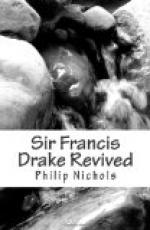The next day (18th October), we sent all the company ashore to seek their masters, saving a young Negro two or three years old, which we brought away; but kept the bark, and in her, bore into the mouth of Cartagena harbour, where we anchored.
That afternoon, certain horsemen came down to the point by the wood side, and with the Scrivano fore-mentioned, came towards our bark with a flag of truce, desiring of our Captain’s safe conduct for his coming and going; the which being granted, he came aboard us, giving our Captain “great thanks for his manifold favours, etc., promising that night before daybreak, to bring as much victuals as they would desire, what shift so ever he made, or what danger so ever incurred of law and punishment.” But this fell out to be nothing but a device of the Governor forced upon the Scrivano, to delay time, till they might provide themselves of sufficient strength to entrap us: for which this fellow, by his smooth speech, was thought a fit means. So by sun rising, (19th October), when we perceived his words but words, we put to sea to the westward of the island, some three leagues off, where we lay at hull the rest of all that day and night.
The next day (20th October), in the afternoon, there came out of Cartagena, two frigates bound for St. Domingo, the one of 58, the other of 12 tons, having nothing in them but ballast. We took them within a league of the town, and came to anchor with them within sacre shot of the east Bulwark. There were in those frigates some twelve or thirteen common mariners, which entreated to be set ashore. To them our Captain gave the greater frigate’s gundeloe, and dismissed them.
The next morning (21st October) when they came down to the western point with a flag of truce, our Captain manned one of his pinnaces and rowed ashore. When we were within a cable’s length of the shore, the Spaniards fled, hiding themselves in the woods, as being afraid of our ordnance; but indeed to draw us on to land confidently, and to presume of our strength. Our Captain commanding the grapnell to be cast out of the stern, veered the pinnace ashore, and as soon as she touched the sand, he alone leapt ashore in their sight, to declare that he durst set his foot aland: but stayed not among them, to let them know, that though he had not sufficient forces to conquer them, yet he had sufficient judgment to take heed of them.
And therefore perceiving their intent, as soon as our Captain was aboard, we hauled off upon our grapner and rid awhile.
They presently came forth upon the sand, and sent a youth, as with a message from the Governor, to know, “What our intent was, to stay upon the coast?”
Our Captain answered: “He meant to traffic with them; for he had tin, pewter, cloth, and other merchandise that they needed.”
The youth swam back again with this answer, and was presently returned, with another message: that, “The King had forbidden to traffic with any foreign nation for any commodities, except powder and shot; of which, if he had any store, they would be his merchants.”




